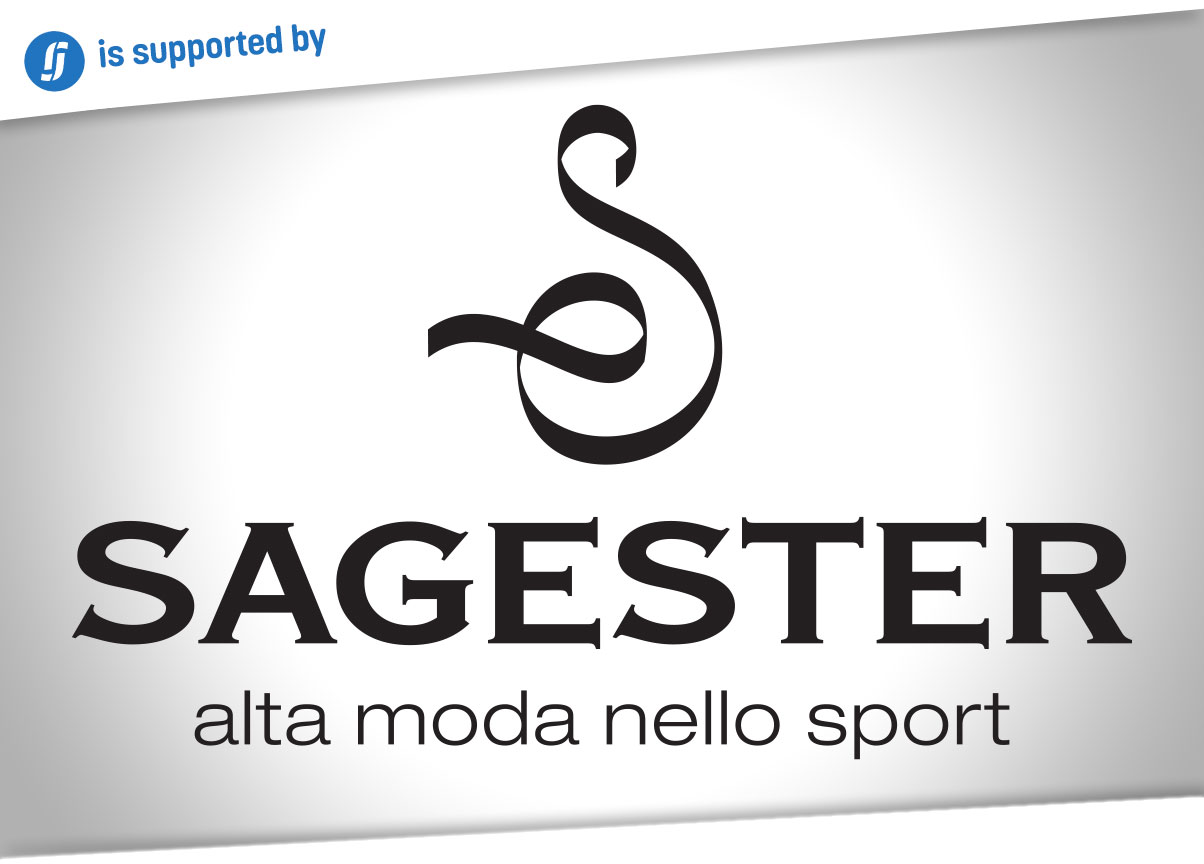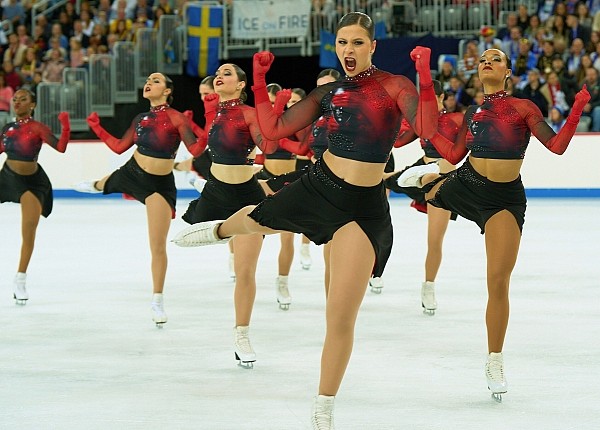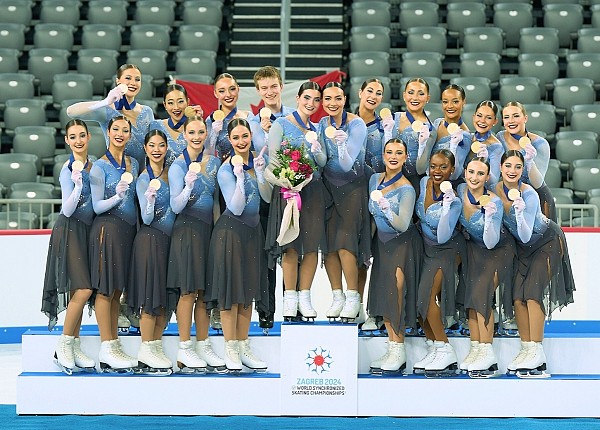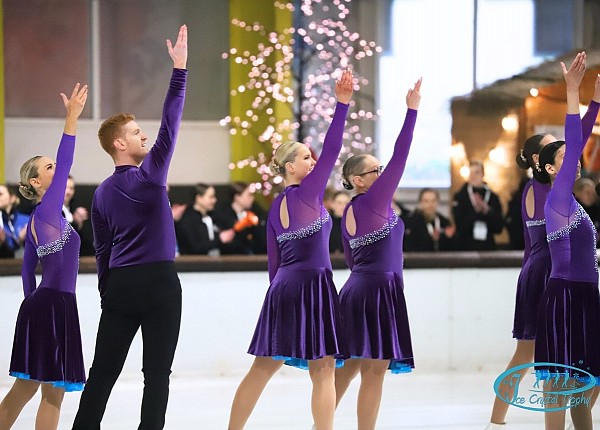Magazine
"This team is literally every coach’s dream"
Magazine
"This team is literally every coach’s dream"

Team Storm has between 16-20 skaters with ages ranging from mid-20s to late 30s.
There is so much talent in Canada in Adult, says Maggie Head, the head coach of Team Storm. This Adult team from Toronto, Ontario, was initially formed to compete at the Winter World Masters Games in 2020 in Austria, and the skaters came together in a really unique way.

Maggie has skated every level from Juvenile to Open, Junior, Senior, Adult I, and Varsity. This coach even competed with Canada’s World Team for both Nexxice and Black Ice. "I have always had a passion for the unique nature of synchronized skating as a team sport and began coaching at a young age. I’ve truly enjoyed working with each time I’ve coached; and have learned a lot about myself, the skaters, and the evolution of the sport along the way," Maggie Head explains.
Actually working full-time for the Royal Bank of Canada in Commercial Markets, this young coach is part-time skating and hockey coach in Toronto and she also sits on Skate Ontario’s Board as a Director.
Actually working full-time for the Royal Bank of Canada in Commercial Markets, this young coach is part-time skating and hockey coach in Toronto and she also sits on Skate Ontario’s Board as a Director.

A skater: Darcie Dixon
Darice lives in Toronto, Canada and works as a management consultant at a global professional services firm. She also spent many years living and skating in the UK while completing a masters and PhD.
She started synchro at her local skating club when she was 11 years old and never looked back. "When I was 15 I joined the national team on Gold Ice Junior, and competed for 7 years at the senior level, including representing Canada and Team Great Britain at the World Championships. Now that my work obligations have intensified, competing at the Adult level seemed like the natural choice to keep active in the sport," she explains.
Interview She started synchro at her local skating club when she was 11 years old and never looked back. "When I was 15 I joined the national team on Gold Ice Junior, and competed for 7 years at the senior level, including representing Canada and Team Great Britain at the World Championships. Now that my work obligations have intensified, competing at the Adult level seemed like the natural choice to keep active in the sport," she explains.
Maggie, you told us that your Team Storm, skates out of your skating school "Simply Skating", came together in a really unique way. What does that mean?
Maggie Head: The manager and I worked hard to select a team of skaters that were hard working, determined, and would gel well together. This team is literally every coach’s dream. The skaters all have demanding work schedules yet they come to the rink for every practice prepared and motivate each other to elevate their skating to the next level. Right now we have a monthly stretching check in, and they’re holding each other accountable (which I love).
How is your team doing with the pandemic?
Maggie Head: I’m not going to lie, it’s been tough. The skaters truly enjoy one another on a personal level and during lockdown they held a weekly zoom chat to keep each other’s spirits up, talk about what was happening in their lives, and stay connected. What was supposed to be a one hour connection sometimes turned in to 4 hours!! We’re slowly returning to the rink - we held skills sessions - and we’re going to continue with them until December
How did you experience the pandemic as Adult skaters?
Darcie Dixon: Although some senior teams in Canada were able to find ice and train cautiously through the earlier months of the pandemic, their needs for ice takes priority over the needs of adult teams. Thus, we only recently were able to lock down summer ice and resume our skills training. Adult teams in the Great Toronto Area have been more open allowing skaters to join in on skills sessions more broadly than team members on the ice. I think adult teams understand that for us skaters, being on the ice is more than about skills training, but also about keeping in touch with our identity and our community. Many skaters are cautious and conscientious of the dangers of COVID-19 and organized sports, so I've seen a healthy respect for the rules and enthusiasm for following new protocols.
Maggie Head: The manager and I worked hard to select a team of skaters that were hard working, determined, and would gel well together. This team is literally every coach’s dream. The skaters all have demanding work schedules yet they come to the rink for every practice prepared and motivate each other to elevate their skating to the next level. Right now we have a monthly stretching check in, and they’re holding each other accountable (which I love).
How is your team doing with the pandemic?
Maggie Head: I’m not going to lie, it’s been tough. The skaters truly enjoy one another on a personal level and during lockdown they held a weekly zoom chat to keep each other’s spirits up, talk about what was happening in their lives, and stay connected. What was supposed to be a one hour connection sometimes turned in to 4 hours!! We’re slowly returning to the rink - we held skills sessions - and we’re going to continue with them until December
How did you experience the pandemic as Adult skaters?
Darcie Dixon: Although some senior teams in Canada were able to find ice and train cautiously through the earlier months of the pandemic, their needs for ice takes priority over the needs of adult teams. Thus, we only recently were able to lock down summer ice and resume our skills training. Adult teams in the Great Toronto Area have been more open allowing skaters to join in on skills sessions more broadly than team members on the ice. I think adult teams understand that for us skaters, being on the ice is more than about skills training, but also about keeping in touch with our identity and our community. Many skaters are cautious and conscientious of the dangers of COVID-19 and organized sports, so I've seen a healthy respect for the rules and enthusiasm for following new protocols.

How long have you been back on the ice?
Maggie Head: We got back on the ice in early August. We’ve just had a break and we’re hoping to return this week.
What are the hygiene measures?
Maggie Head: Skate Ontario and each individual rink have their own policies that skating clubs and schools must adhere to. Before skaters arrive at the rink, they have to fill out a health screener for the day. They arrive at the rink mostly dressed with a mask on. When they get in the rink, they sanitize and sign in. Then they put their skates on - in chairs greater than 6 feet apart. The team then enters the rink and skaters must leave their belongings at designated stations that are 6 feet apart. Once they get on the ice they can take their masks off if they wish but have to put them on as soon as they step off the ice.
Maggie Head: We got back on the ice in early August. We’ve just had a break and we’re hoping to return this week.
What are the hygiene measures?
Maggie Head: Skate Ontario and each individual rink have their own policies that skating clubs and schools must adhere to. Before skaters arrive at the rink, they have to fill out a health screener for the day. They arrive at the rink mostly dressed with a mask on. When they get in the rink, they sanitize and sign in. Then they put their skates on - in chairs greater than 6 feet apart. The team then enters the rink and skaters must leave their belongings at designated stations that are 6 feet apart. Once they get on the ice they can take their masks off if they wish but have to put them on as soon as they step off the ice.
Where are you in the building of your program?
Darcie Dixon: We are working on our individual skills at the moment. The soonest our team is likely to compete is in May 2021 so we aren't as in so much of a rush to build a program. We can take the time to work on matching our skills and boosting our individual capabilities.
What has the pandemic taught you as a coach?
Maggie Head: I honestly see this as an opportunity to focus on the fundamentals. We went right back to basic edges and learning about the run of the blade to start to challenge the limits of our blades’ abilities. Getting out of the individual comfort zone with turns and edges has been really great, because we’re focussed on skill acquisition and development. As a coach I’ve come up with some pretty interesting drills and have included some teaching aids such as hula hoops.
Darcie Dixon: Team Storm is a very special community of professionally-minded and hardworking women who have come together for the love of the sport. Though we come from a diversity of backgrounds and past skating experiences, our chemistry as a team helped us come together quickly. This is a team that loves to be with each other no matter what, and the pandemic is no exception. We have kept in touch socially with frequent Zoom calls and supportive messages. Don't let the mushy words fool you, we're a competitive bunch that's dedicated to going for gold.
For this season, what are your team goals?
Maggie Head: Right now we’re focussed on improving our individual skating skills while working on elements that we can synchronize on to entrench the team’s skating style as well as synchronization. As we all know, everyone hears music differently, so we’re working on counting and timing and pushing the limits of our skating while we’ve been given some time to do so
Do you already know which competitions you are going to participate in?
Maggie Head: Right now we’re focussed on Obersdorf 2021 but that is predicated on a lot of variables. I’ve talked with other Canadian coaches planning on going as well, and we’re hoping to work together to create opportunities for our teams to perform before the competition. We’re planning on Obi 2021, but we are re-evaluating as a team in January.
Darcie Dixon: We are working on our individual skills at the moment. The soonest our team is likely to compete is in May 2021 so we aren't as in so much of a rush to build a program. We can take the time to work on matching our skills and boosting our individual capabilities.
What has the pandemic taught you as a coach?
Maggie Head: I honestly see this as an opportunity to focus on the fundamentals. We went right back to basic edges and learning about the run of the blade to start to challenge the limits of our blades’ abilities. Getting out of the individual comfort zone with turns and edges has been really great, because we’re focussed on skill acquisition and development. As a coach I’ve come up with some pretty interesting drills and have included some teaching aids such as hula hoops.
Darcie Dixon: Team Storm is a very special community of professionally-minded and hardworking women who have come together for the love of the sport. Though we come from a diversity of backgrounds and past skating experiences, our chemistry as a team helped us come together quickly. This is a team that loves to be with each other no matter what, and the pandemic is no exception. We have kept in touch socially with frequent Zoom calls and supportive messages. Don't let the mushy words fool you, we're a competitive bunch that's dedicated to going for gold.
For this season, what are your team goals?
Maggie Head: Right now we’re focussed on improving our individual skating skills while working on elements that we can synchronize on to entrench the team’s skating style as well as synchronization. As we all know, everyone hears music differently, so we’re working on counting and timing and pushing the limits of our skating while we’ve been given some time to do so
Do you already know which competitions you are going to participate in?
Maggie Head: Right now we’re focussed on Obersdorf 2021 but that is predicated on a lot of variables. I’ve talked with other Canadian coaches planning on going as well, and we’re hoping to work together to create opportunities for our teams to perform before the competition. We’re planning on Obi 2021, but we are re-evaluating as a team in January.

How is the Adult category developing in Canada?
Maggie Head: There is so much talent in Canada in Adult! I honestly love watching how much the teams are pushing the boundaries and elevating the level of competition. I also love watching the skaters I grew up skating with compete - I have former teammates on almost every team and I think it’s so great to be able to watch everyone compete as such a great level and continue to enjoy this amazing sport.
For you, what are the advantages and difficulties of this category?
Maggie Head: The advantages of Adult are that the skaters are mature, they are at the rink because they want to be there and they want to work hard. At this stage, most of these skaters have competed Junior or Senior and they know what it takes to be successful. These skaters are honestly so dedicated to helping one another learn and grow, it’s incredible. I send out video and I get questions back, these skaters are truly dedicated to doing better every practice and elevating their level of skating. The only difficulty we have is work schedules, but we try to work around that with social skaters. If a skater misses practice, before they come back they’ve watched video, they’ve connected with the skaters they skate beside and odds are they’ve called or messaged me.
Darcie Dixon: COVID-19 has been a tough thing for synchro. It's impossible to be in hold on while social distancing! But it is also pushing our sport to become more creative and to come together in a challenging time. No matter how this season turns out, whether competitions are cancelled or not, it is still a great opportunity to work on core skills, individual abilities, and teamwork. Synchro skaters are strong, and our ability to come together in challenging times is surely what will help us get through to the other side of the pandemic! Ultimately being safe and saving lives is the most important thing.
Maggie Head: There is so much talent in Canada in Adult! I honestly love watching how much the teams are pushing the boundaries and elevating the level of competition. I also love watching the skaters I grew up skating with compete - I have former teammates on almost every team and I think it’s so great to be able to watch everyone compete as such a great level and continue to enjoy this amazing sport.
For you, what are the advantages and difficulties of this category?
Maggie Head: The advantages of Adult are that the skaters are mature, they are at the rink because they want to be there and they want to work hard. At this stage, most of these skaters have competed Junior or Senior and they know what it takes to be successful. These skaters are honestly so dedicated to helping one another learn and grow, it’s incredible. I send out video and I get questions back, these skaters are truly dedicated to doing better every practice and elevating their level of skating. The only difficulty we have is work schedules, but we try to work around that with social skaters. If a skater misses practice, before they come back they’ve watched video, they’ve connected with the skaters they skate beside and odds are they’ve called or messaged me.
Darcie Dixon: COVID-19 has been a tough thing for synchro. It's impossible to be in hold on while social distancing! But it is also pushing our sport to become more creative and to come together in a challenging time. No matter how this season turns out, whether competitions are cancelled or not, it is still a great opportunity to work on core skills, individual abilities, and teamwork. Synchro skaters are strong, and our ability to come together in challenging times is surely what will help us get through to the other side of the pandemic! Ultimately being safe and saving lives is the most important thing.




